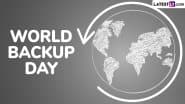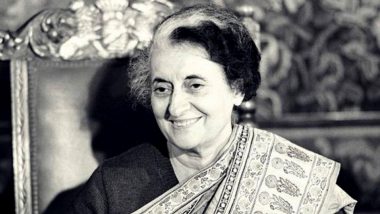India observes the 36th death anniversary of Indira Gandhi on Saturday. The former prime minister of India was assassinated on October 31, 1984, by her Sikh bodyguards to take revenge of the Operation Blue Star. Indira Gandhi, also known as the Iron Lady of India, was the first and till date the last female prime minister of India. She took bold steps during her tenure as PM of the country, including leading India to victory in 1971 war against Pakistan and conducting a nuclear test in Pokhran in 1974.
Gandhi was born on November 19, 1917, as Indira Priyadarshini Nehru to Pandit Jawaharlal Nehru and Kamala Nehru in Allahabad. Gandhi became the president of the Congress in 1959. She served as Prime Minister from January 1966 to March 1977 and again from January 1980 until her assassination in October 1984. Indira Gandhi Death Anniversary: 'Only Man of Her Cabinet' – Five Lesser Known Facts About India's Iron Lady.
Indira Gandhi is considered as one of the strongest leaders in the history of India Reasons Why Indira Gandhi is Called Iron Lady Of The Country?
- In 1942, at the age of 25, Indira had challenged the societal norms as she decided to marry Feroze Ghandy (name later changed to Feroze Gandhi) who was a Parsi.
- After Jawaharlal Nehru's death, she was appointed as a member of the Rajya Sabha in 1964 and also became minister of Information and Broadcasting in Lal Bahadur Shastri's cabinet.
- She declared war against Pakistan in 1971 to liberate Bangladesh. Gandhi led India to victory in the war.
- India's first nuclear test was conducted under the India Gandhi government in 1974 in Pokhran. It was code-named "Smiling Budha".
- She became the first female prime minister of India in 1966. She remained at the post till 1977. She again assumed charge in 1984.
Controversial decisions are taken by Indira Gandhi:
In 1975, Gandhi imposed emergency in the country. The period that lasted for the next 22 months witnessed the suspension of civil liberties, the right to freedom of speech and expression, and curtailment of political rights. The period is also referred to as the "darkest phase" of Indian democracy.
In 1984, she ordered military action on Golden Temple to flush out Sikh extremists from the holy shrine. In the military operation, the holy shrine was damaged, creating resentment among the Sikh community. On October 31, 1984, at about 9:20 am Gandhi was on her way to be interviewed by British actor Peter Ustinov when she was assassinated by her Sikh bodyguards.
(The above story first appeared on LatestLY on Oct 31, 2020 08:00 AM IST. For more news and updates on politics, world, sports, entertainment and lifestyle, log on to our website latestly.com).













 Quickly
Quickly




















